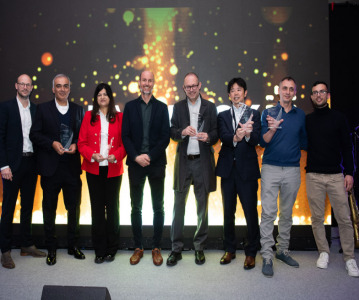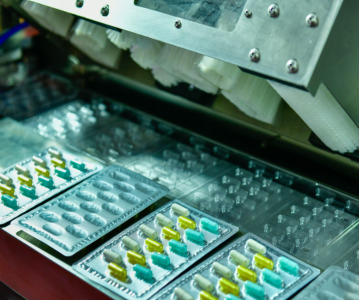Rise in home-based healthcare shaping pharma packaging and drug delivery

The pharma packaging and drug delivery industry has long been synonymous with rapid innovation. As medicine advances and patient needs change, so too should drug packaging and devices.
This has been particularly evident during the pandemic, when one growing issue was brought into sharp relief – the need for remote treatment options.
To understand the shift towards patient-centricity, CPHI spoke with Cindy Reiss-Clark, Senior VP Commercial Markets and Commercial Solutions at West Pharmaceutical Services. She tells us about the growing popularity of self-administered medication, the impact of COVID-19 on innovation, and why West is “all in” on digitisation.

Register now for Pharmapack 2022, taking place online and in person.
What are some of the biggest challenges the packaging and drug delivery industry faces today?
There is a growing demand among patients for an overall better experience and greater participation in their health care. This is placing pressure on health care systems and pharmaceutical companies to find ways to become more patient-centred. Their quality of life and how their drugs and treatments are delivered is a vital part of patient advocacy and focusing on their overall outcomes.
For example, the COVID-19 pandemic has served as a catalyst to a safer, more efficient and more patient-centric experience through increased telehealth options, putting patients back in control of their care and forcing organisations to streamline services and find innovative solutions. It has also highlighted a trend towards the consumerisation of healthcare - giving more power to the patients has shown them they have options in who they see and how they are treated. The patient-centric approach is essential because it lays the foundation of high-quality healthcare, and patients with better care experiences often have better health outcomes.
Where do you see the most innovation happening in the sector?
Digital innovation continues to advance as the state of health care is rapidly evolving towards a consumer-centric model where technologies play an increased role. Healthcare ecosystems are continually growing and becoming more digitally smart, where hospitals and healthcare providers are connecting care from hospital to home by engaging patient experiences and devices.
Technological advancements also now allow larger volumes to be administered subcutaneously, over a longer period, in a non-clinical setting by ensuring user requirements are at the heart of the patient experience. Self-administration by a user has historically been unsuccessful for several reasons resulting in patients frequently having to travel to health clinics and hospitals for treatment.
This inconvenience and disruption to daily life, transportation costs, and the constant reminder of ones’ disease state have driven pharmaceutical and device manufacturers to further prioritize the overall patient experience when developing alternative administration options. Today’s treatment paradigm focuses on designing cost-effective drug administration processes that offer a better patient experience – allowing people to access treatment in the comfort of their home instead of a hospital setting.
How is West driving patient centricity? Can you share examples of product solutions transforming the user experience?
For nearly a century, our mission of improving patient lives around the world has stayed the same and our mantra of “every component has a patient’s name on it” keeps our focus squarely grounded on the patient.
When we think about patient centricity for us there is the patient experience, but also the experience of the healthcare professional who is administering the care to the patient.
With an estimated 50 percent or more of the global population living with at least one chronic health condition, patients have an increasing need and desire for easy-to-use and reliable self-administered medications. Pharmaceutical and medical device manufacturers are answering this call by rapidly innovating new solutions that benefit the whole person and not just their health condition, that help them stay active and enjoy life, whether they’re on top of a mountain skiing or simply watching their child’s soccer game.
West recognized these trends over a decade ago and have been investing in wearable technologies since 2010. West’s first offering was the wearable and programmable SmartDose® injector, which is a technology used by Amgen today in their Pushtronex® device and this became the first FDA approved wearable for commercial use.
For the healthcare provider, especially in a hospital setting, a lot of times they are in a situation where every minute counts. West has developed solutions such as our Vial2Bag™, Mix2Vial® and Mixject® vial adaptor products, to provide simple solutions for IV medication preparation at the point of care to enable reconstitution and transfer of a drug between a vial and an IV bag. The innovative needle-free and easy-to-use design is ideal for immediate use.
Does the fast rate of innovation in the industry pose a challenge? And what are some of the critical elements to consider for keeping up with this rapid pace?
On the contrary, I think there is opportunity in our industry, and the drug development process overall, to enable a faster rate of innovation. The recent development of the COVID-19 vaccines and related treatments is a prime example. The global life sciences community proved that it could not only develop, obtain approvals, manufacture and distribute a new vaccine in a matter of months rather than years. First, this should give hope that mRNA technology could be effective for a range of unmet medical needs, but beyond that it proves the world can rally together and develop various innovations in record time to support the delivery of life-saving medicine. Like the saying goes “necessity is the mother of innovation.”
As therapies become more complex and shift towards self-administration, pharmaceutical and biopharmaceutical manufacturers are under pressure to bring more intricate devices to the market, that are also easy to use, while working differently with their customers to work towards outcomes at faster speeds. This is particularly challenging when constantly changing regulations place more responsibility on sponsors to prove not only that their drug is reliable and safe, but also that the device is fully integrated and satisfies usability requirements. Relying on a provider with both combination product and services expertise allows manufacturers to simplify their supply chain and gain compelling benefits, such as fewer partners, improved knowledge transfer and scalability across a product’s life cycle, and faster root cause analysis/resolution if problems arise.
Could you please share an overview of how West is embracing digitalisation?
When it comes to digitalisation, West is all in. West is actively investing in its digital transformation journey, and it covers all aspects of our business. We believe digitalisation will change how we do business, and the benefits will span from manufacturing to delivering better patient care and compliance with their medicines.
Our journey embraces three strategic pillars: the external experience, the internal experience and the digitisation of products. The external experience entails creating a highly personalised digital channel for customers across transactions, data and science as well as consumer-grade, device-agnostic experience for customers, partners and vendors around the world. The internal experience includes executing a multi-year ERP consolidation into S/4 HANA to enable a real-time enterprise with data integrity and finally, the digitisation of products consists of utilizing software and platforms to create value for customers and stakeholders.
To support our digital transformation, we’ve expanded our capabilities with three new state-of-the-art Digital Technology Centers in India and Taiwan. These new capabilities are pushing the limits of hardware, software and AI to drive innovation for our business and for our customers.
What challenges did the pandemic present West with?
The pandemic presented a variety of challenges to us, as well as many others. With things changing daily, one of the biggest challenges we had as leaders was to quickly create an agile work environment and engagement strategy that could address the needs of our employees and enable innovation and collaboration to drive the business forward.
Due to the vital role we continue to play in addressing COVID-19, we continue to experience an unprecedented demand for our high-quality components. We had to take proactive measures to mitigate risk and provide our customers continuity of supply and minimize delays wherever possible by:
- Expanding our manufacturing capability, including automation, through an increased and accelerated total capital investment of over $300 million.
- Hiring over 1,000 new team members since the start of the pandemic as we expand capacity to meet unprecedented demand.
- Increasing production operations effectively to run 24 hours a day, 7 days a week to meet this growing demand.
- And focusing on retaining our employees and ensuring a safe and healthy work environment.
The rapidly changing environment and the impact of COVID-19 on the global supply chain led to significant cost inflation and delays. It was clear no industry was immune to these challenges, and it required companies to work more closely than ever before to find ways to resolve and overcome these challenges together.
These new market dynamics have required us to implement a prioritization model to address the growing requirements of our customers and take a thoughtful approach to balance and manage these priorities actively. The success of this approach requires partnership with customers and suppliers, including a greater level of transparency regarding production demands and filling schedules to ensure we are addressing the right need at the right time.
What are West’s main priorities and aspirations looking ahead?
West will continue leading with a customer and market lens. Advanced therapies, combination products and a systems approach continue to be our main priorities to create value-add offerings.
We also continue to invest in capacity and leverage our extensive global manufacturing network of 25 sites to provide flexible, large-scale production capabilities, which allows us to minimise customer risk and meet growing demands.
As you look across the pharmaceutical industry's drug pipelines and new drug applications, there is a growing need to provide solutions to support increasingly more sensitive and complex molecules and combination products. With that comes an increasingly regulated environment for these products and increased use of ready-to-use packaging products by drug companies.
Our customers are facing a fragmented landscape with multiple suppliers when trying to find the right containment solutions for these products. Most glass companies must partner with elastomer suppliers and other service providers to provide solutions and better-characterized products. But no company has developed a truly integrated system from the ground up until now.
Through our recently announced strategic partnership with Corning, West will redefine the future of containment solutions, creating a truly integrated system that will de-risk our customers' drug development and manufacturing process
What does Pharmapack Europe mean to you?
We are excited to be back at Pharmapack Europe this year after two years due to the pandemic. We are looking forward to this opportunity to engage with current and potential customers across the globe to discuss the latest challenges and innovations and how we can work together to bring new treatments to patients.
How would you describe the future of West in one sentence?
Continuing to co-innovate and collaborate with our customers to improve the overall experience and care for patients.
Related News
-
News A Day in the Life of Oncology Start-Up Co-Founder & CEO
This Women's month we are highlighting stories of women in the pharma industry (building on what we do every month to support women), so for the Day in the Life of we are speaking to Sharon Cunningham who is the Co-founder and CEO of Shorla On... -
News Women in Pharma: Manufacturing personal and team success
Our monthly Women in Pharma series highlights the influential lives and works of impactful women working across the pharmaceutical industry, and how the industry can work towards making the healthcare industry and workplace more equitable and inclusive... -
News A Day in the Life of a Head of Market Insights in med devices
The latest interview in the Day in the Life of Series is with Alper Hulusi, Head of Market Insights for ClariMed. Hulusi also works to try to get to know people, this time from the other side of pharma – the people that will be using the the... -
News CPHI Podcast Series: Packaging expert perspectives at Pharmapack 2025
This month's podcast episode sounds a little different, covering the latest event in Paris – Pharmapack 2025. Digital Editor Lucy Chard speaks to several experts direct from the floor of the show, bringing you right in on the action.&nbs... -
News Vertex Pharmaceuticals stock jumps as FDA approves non-opioid painkiller
UK-based Vertex Pharmaceuticals saw their stock shares soar as the US FDA signed off on the non-opioid painkiller Journavx, also known as suzetrigine, for patients with moderate to severe acute pain, caused by surgery, accidents, or injuries. -
News The 2025 Pharmapack Awards: recognising innovation and patient centricity
This year in Paris the Pharmapack Awards recognised the achievements across categories in the industry, aswell as including some new categories to highlight exceptional work and people. -
News Pharmapack 2025: From the Floor in Paris
Pharmpack gears up for another week in Paris at the Porte De Versailles. The two-day show taking place on the 22–23 January, will cover contract packaging, device innovation, and sustainability among other topics. -
News Visibility, Integration, and Opportunity with CPOs: A Pharmapack Interview
At Pharmapack 2025 in Paris the informative content tracks this year will feature a Contract Packaging track. A critically important topic for those working in the field, which speaker Alexander Schäfer from Sharp Services discusses in the fo...
Position your company at the heart of the global Pharma industry with a CPHI Online membership
-
Your products and solutions visible to thousands of visitors within the largest Pharma marketplace
-
Generate high-quality, engaged leads for your business, all year round
-
Promote your business as the industry’s thought-leader by hosting your reports, brochures and videos within your profile
-
Your company’s profile boosted at all participating CPHI events
-
An easy-to-use platform with a detailed dashboard showing your leads and performance







